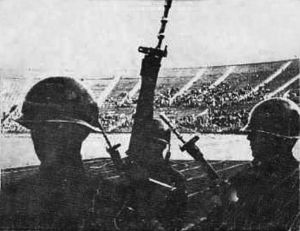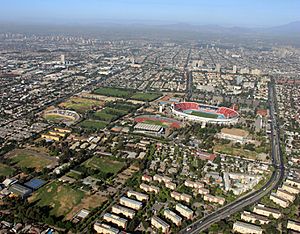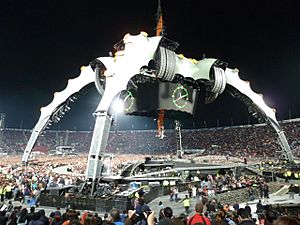Estadio Nacional Julio Martínez Prádanos facts for kids
| Estadio Nacional Julio Martínez Prádanos | |
|
El Coloso (The Colossus)
|
|
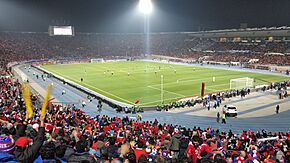
Interior of the stadium.
|
|
| Former names | Estadio Nacional (1938–2008) |
|---|---|
| Location | Av. Grecia 2001, Estadio Nacional Sports Park, Ñuñoa, Santiago, Chile |
| Coordinates | 33°27′52″S 70°36′38″W / 33.46444°S 70.61056°W |
| Public transit | |
| Owner | Municipality of Ñuñoa |
| Operator | Chiledeportes |
| Capacity | 46,190 |
| Record attendance | 85,268 (Universidad de Chile–Universidad Católica, 29 December 1962) |
| Field size | 105 m x 68 m |
| Surface | Grass |
| Construction | |
| Broke ground | 1937 |
| Opened | December 3, 1938 |
| Renovated | 2009–10 |
| Expanded | 1962 |
| Reopened | September 12, 2010 |
| Construction cost | $18,000,000 |
| Architect |
|
| Main contractors | Salinas y Fabres |
| Tenants | |
| Chile national football team Universidad de Chile Palestino Santiago Morning Deportes Recoleta Deportes Melipilla Real Juventud San Joaquín Municipal Santiago Gremio de Santiago Selknam (rugby club) |
|
The Estadio Nacional Julio Martínez Prádanos National is a famous association football stadium in Santiago, Chile. It's often called El Coloso, which means "The Colossus" because of its huge size. The stadium is part of a large area called the Estadio Nacional Sports Park. This park covers 62 hectares and has many other sports facilities. You can find tennis courts, a swimming center, a modern gymnasium, a velodrome for cycling, and even a BMX track there.
Building the stadium started in February 1937, and it opened its doors on December 3, 1938. Its design was inspired by the Olympiastadion in Berlin, Germany. The Estadio Nacional was one of the main places for the FIFA World Cup in 1962. It even hosted the final match where Brazil won against Czechoslovakia 3–1. In 1948, it hosted the South American Championship of Champions, a competition that helped inspire the famous UEFA Champions League and Copa Libertadores.
Sadly, the stadium was also used as a place to hold people after the 1973 military coup. Many years later, in 2009, big plans were made to modernize the stadium and the surrounding sports park. It hosted the opening and closing ceremonies for the 2014 South American Games and the 2023 Pan American Games. It also hosted the opening ceremonies for the 2023 Parapan American Games.
Contents
History of the National Stadium
The land where the stadium stands was once farmland. It was given as a gift in 1918 by a kind landowner named Jose Domingo Cañas. The very first sports event at the new stadium happened on December 3, 1938. It was a friendly football game between the Chilean team Colo-Colo and the Brazilian team São Cristóvão. Colo-Colo won that exciting match 6–3.
This stadium has been a key location for many important football tournaments. It hosted all the matches for the 1941, 1945, and 1955 South American Football Championships. It also hosted several games during the 1991 and 2015 Copa América. Beyond football, the stadium hosted the final games of the 1959 World Basketball Championship. These games were played outdoors because the planned indoor venue wasn't ready in time.
In the early 1960s, the stadium was made even bigger for the 1962 FIFA World Cup. Workers removed the cycling track around the stadium and added more seats. This increased its capacity to about 95,000 people. During the World Cup, the stadium hosted group stage games. These included a very intense and famous match between Italy and Chile, known as the Battle of Santiago. The stadium also hosted a quarter-final, a semi-final, the third-place play-off, and the final. Brazil became world champions there for the second time. Chile achieved its best international football success by defeating Yugoslavia 1–0 in the third-place play-off.
Today, the Estadio Nacional is the home field for Chile's national football team. It's also where the first-division club Universidad de Chile plays its home games. Besides sports, the stadium is used for other big events. These include political celebrations, charity events like the Teletón, and many concerts. Since 1995, the stadium has been the final stop for the Teletón, a 28-hour TV fundraiser. Up to 100,000 people gather there for this annual event. On July 5, 2008, the stadium was officially renamed Estadio Nacional Julio Martínez Prádanos. This was to honor Julio Martínez, a famous Chilean sports journalist who passed away earlier that year.
The Stadium as a Detention Center
After the military coup on September 11, 1973, the stadium was used as a place to hold many people. More than 40,000 individuals were held in the stadium complex during that time. The main field and seating areas were used for men, while women were held in the swimming pool changing rooms. Other parts of the stadium, like locker rooms and corridors, also became temporary prison facilities. Interrogations took place in the velodrome.
Because of this, the Soviet Union team refused to play a World Cup qualifier match there. As a result, Chile automatically qualified for the 1974 World Cup. This difficult period in the stadium's history is shown in films like the 2002 documentary Estadio Nacional and the 2007 Swedish film The Black Pimpernel. The 1982 film Missing also shows the events of September 11, 1973, at the stadium.
In 2011, a special part of the stadium was set aside to remember those who were held there. This section, called "Escotilla 8", has old wooden bleachers and is surrounded by a barbed wire fence. It serves as a memorial to honor the prisoners.
Modernizing the Stadium (2009–2010)
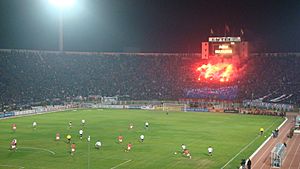
On June 15, 2009, President Michelle Bachelet announced big plans to make the stadium and its facilities more modern. A lot of money was set aside for these improvements. The changes included adding a roof over all the seats and installing new seats throughout the stadium. This would lower the capacity to about 47,000. A new, advanced scoreboard was also planned. A deep pit was to separate the track from the spectators instead of a fence.
Because the stadium is a national monument, its outside look had to stay the same. The new roof structure was planned to be placed on top without changing the exterior. The stadium closed on August 15, 2009, for these works. It was supposed to reopen in March 2010, but the work wasn't finished in time. The plan for the roof was later postponed due to financial issues after the February 27, 2010 earthquake. Even though the stadium had minor damage from the earthquake, it partly opened for a football match. It was officially reopened on September 12, 2010, during Chile's bicentennial celebrations.
Updates for the 2014 South American Games
On September 12, 2010, President Sebastián Piñera announced more plans for the stadium. Its seating capacity would be increased to 70,000 for the 2014 South American Games held in Santiago. These construction works began in 2012.
On June 3, 2011, even more renovation plans were shared. The entire area around the stadium was to become a large park called "Citizenry Park." More than 70% of this new 64-hectare park would be green spaces. It would also include new features like a lagoon and restaurants. The park was expected to be ready for the 2014 games. New sports venues were built for these games, too. These included two modern gymnasiums, a new heated pool for synchronized swimming, a renovated velodrome, and an expanded high-performance sports center.
The Estadio Nacional Sports Park (2023)
The Estadio Nacional Sports Park was created as part of the improvements for the 2023 Pan American Games. This project involved building new facilities for high-energy sports and fun activities. The park officially opened in 2023, offering a wide range of modern spaces for athletes and the public.
Stadium Attendance Records
The highest number of people ever at a match in Estadio Nacional was 85,268. This happened on December 29, 1962, for a Primera Division football game. In that match, Universidad de Chile beat Universidad Catolica 4–1. More recently, in the 2016–17 season, Universidad de Chile had an average home league attendance of over 30,000 fans for their games.
1962 FIFA World Cup Matches
The Estadio Nacional hosted ten games during the 1962 FIFA World Cup. This included some of the most important matches, like the final.
| Date | Time (UTC−04) | Team No. 1 | Res. | Team No. 2 | Round | Attendance |
|---|---|---|---|---|---|---|
| 30 May 1962 | 15:00 | 3–1 | Group 2 | 65,006 | ||
| 31 May 1962 | 15:00 | 0–0 | Group 2 | 65,440 | ||
| 2 June 1962 | 15:00 | 2–0 | Group 2 | 66,057 | ||
| 3 June 1962 | 15:00 | 2–1 | Group 2 | 64,922 | ||
| 6 June 1962 | 15:00 | 2–0 | Group 2 | 67,224 | ||
| 7 June 1962 | 15:00 | 3–0 | Group 2 | 59,828 | ||
| 10 June 1962 | 14:30 | 1–0 | Quarter-finals | 63,324 | ||
| 13 June 1962 | 14:30 | 4–2 | Semi-finals | 76,594 | ||
| 16 June 1962 | 14:30 | 1–0 | Third place play-off | 66,697 | ||
| 17 June 1962 | 14:30 | 3–1 | Final | 68,679 |
Concerts and Events
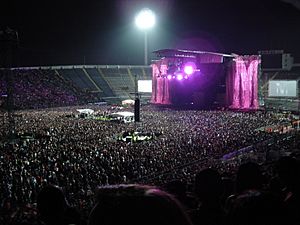
The Estadio Nacional is a popular place for many international and national concerts throughout the year. In 1977, Spanish singer Julio Iglesias was the first solo artist to perform there. Years later, in 1989, Rod Stewart held what many consider the first big rock concert by an international artist at the venue. About 70,000 fans attended his Out of Order Tour show, which was even broadcast on TV. After this, Santiago became a regular stop for many international artists.
In 2001, the Chilean band Los Prisioneros made history by being the first act to perform two concerts on consecutive days at the stadium. Madonna was the first international artist to do the same in 2008. More recently, in 2022, Puerto Rican star Daddy Yankee sold out three concerts in one day. The British band Coldplay also set a record by scheduling four consecutive concerts as part of the same tour in 2022. In 2023, the Chilean band Los Bunkers also booked two consecutive concerts. In 2024, Colombian singer Karol G became the first solo female artist to sell out three consecutive concerts at the venue.
Some concerts at the stadium have even been recorded and released for fans. For example, the show by Cuban folk singer Silvio Rodríguez in March 1990 was released as a 2CD set. Both concerts by Los Prisioneros in late 2001 were released as an album and a video. The English heavy metal band Iron Maiden recorded their show during The Final Frontier World Tour in April 2011. This show was later released as an album and video called En Vivo!.
Stadium Capacity
When the stadium was built in 1937, it could hold 48,000 spectators. Some people thought this was too big and called it a "white elephant" because they believed it would never be full. For the 1962 FIFA World Cup, the stadium was expanded to fit 74,000 seats. With standing areas, it could hold over 80,000 people. This was done by removing the cycling track and moving it to another location. Over the years, the seating capacity was reduced to make sure there were clear escape routes and to prevent accidents.
For the 2000 World Junior Championships in Athletics, individual seats were installed. This reduced the capacity to 66,000 spectators. This change helped control the number of people inside, especially for events like the visit of Pope John Paul II in 1987, which was attended by over 90,000 people. The official capacity of the stadium as of 2014 is 48,665.
See also
 In Spanish: Estadio Nacional Julio Martínez Prádanos para niños
In Spanish: Estadio Nacional Julio Martínez Prádanos para niños
 | Selma Burke |
 | Pauline Powell Burns |
 | Frederick J. Brown |
 | Robert Blackburn |



